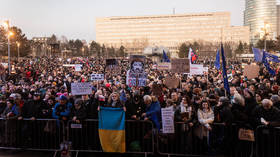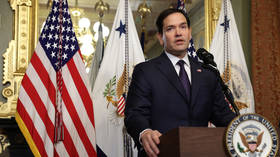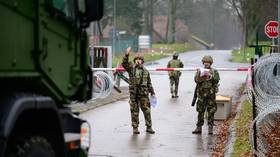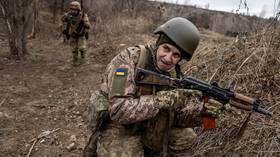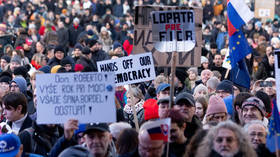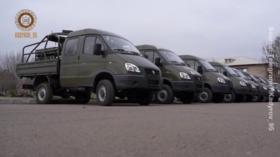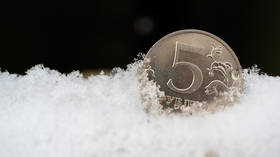'Water issue held hostage to the detriment of the Israelis and Palestinians’
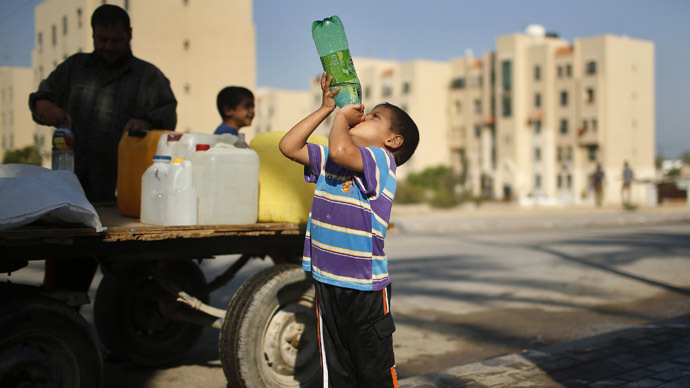
It’s just a matter of time before the 1.5 million people living in Gaza have no clean water to drink, Gideon Bromberg, Israeli director of EcoPeace-Friends of the Earth Middle East, told RT.
RT:You're saying there must be a new agreement to replace the Oslo Accords between Israeli and the Palestinians when it comes to water. Why is the old system not working, in your view?
Gideon Bromberg: The situation on the ground speaks for itself. The Oslo Accords were signed 20 years ago as an interim agreement that was supposed to be replaced after five years. Perhaps like no other issue of the final status, water simply cannot wait. The population has increased, in fact the Palestinian population has almost doubled in these last 20 years. Palestinians are not getting enough water to meet their basic needs and the treatment of sewage has not progressed. So we are seeing a lot more pollution of shared Israeli-Palestinian water. It is really a lose- lose situation at the moment, where both sides are failing to meet their urgent needs – water and pollution prevention – by sticking to the agreement that was supposed to be replaced [years ago].
RT:Israel produces enough water on its own territory. Why do they need to produce water from the disputed territories? Surely that only antagonizes the situation?
GB: The current situation is that Israel enjoys the benefit of the lion’s share of the shared water. Israel enjoys the benefits of some 80 percent of shared waters between the Israelis and Palestinians, and that situation is not fair, as it leaves Palestinians with insufficient amounts of water. It means that on every roof throughout the West Bank you have a water cistern that is storing water when water is made available for the municipality, and water is not made available for the municipality in Palestinian towns and cities on the daily basis. In fact, as we approach the summer in areas like Bethlehem, Hebron they will be getting water once every two or three weeks, sometimes even once a month. That’s a completely different reality within Israel, where water is available 24/7.
This current situation is due to sticking to the interim accord. Friends of the Earth Middle East are really leading the effort saying that the notion that we won’t agree on anything – until we agree on everything – is really holding water and the environment as a hostage to the failure of the other issues. And that’s to the detriment of the Palestinian population, plus also to the detriment of the Israeli population because the same type of the unworkable system that is in place on water supply, is also in place on the issue of sanitation. You have a lot of agreements that need to be come to, on every sewage treatment plant you have a second level of approval required when it comes to the agreement of the civil administration, at least to enormous delay, also delay in the building of sewage plants for Palestinian cities. The result will be that more raw sewage flows mostly downhill to Israel from the Palestinian populations.
It is really a lose-lose, we are really shooting the interests of the both sides in the foot by not moving forward on water. When water is indeed an issue, that is completely solvable today, much due to the Israel’s leadership and desalination and treating waste water on its side so that the pie has increased dramatically. Yet we are stuck with an agreement and neither side is willing to move forward on the agreement on water, first in fear that on the Israeli side there is an idea, “What are we going to get in exchange?”, and on the Palestinian side the idea is, “If we come to an agreement on water, then it will give legitimacy to the Israeli side and unless we have an agreement on all issues we don’t want legitimacy.” Really, water environment is being held hostage to the detriment of the public of both sides.
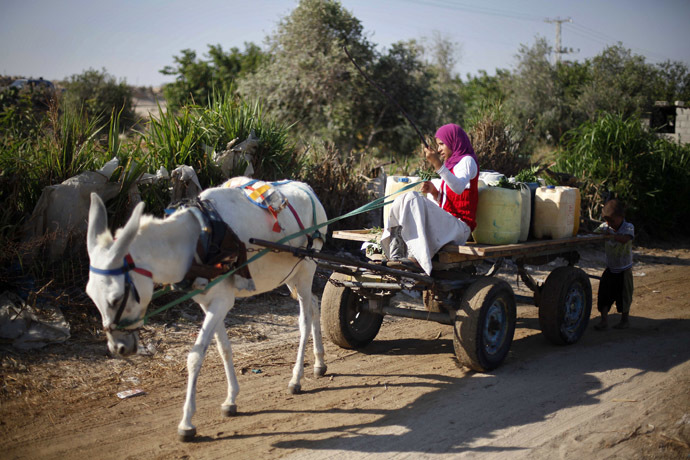
RT:How much of a hold does this water issue give Israel over the Palestinians?
GB: Israel has full domination. It’s like having a single bath tub and two straws drinking from it. One side, the Israeli side, can draw from that straw as much water as it wants but from the Palestinian straw there must be Israeli and Palestinian agreement for every cubic meter, for every water project to be advanced.
In fact Israel has veto power and if we were to move forward on a new agreement, if we put on the table what a new agreement could look like, Palestinians would have far more independence to extract their rightful share of water resources, but it also has the responsibility to protect the shared water body itself, something that is not being achieved for the moment.
Moving forward to a new agreement presents the opportunity of the relatively low-hanging fruit on one of the five final status issues that really can bring a tremendous gain to both sides. To the Palestinian president, moving forward on a new water agreement can really change the reality felt by every Palestinian at home because it can mean more water in every single Palestinian house. On the Israeli side it can mean removing sewage that currently pollutes streams that flow to every major city, be it Tel-Aviv, Haifa, Persheva - Palestinian sewage that flows into Israeli cities.
The failure to move forward is very much related to the mindset that is “Well, we must agree on all issues – Jerusalem, settlements, borders – or we agree on no issues.” And therefore, for 20 years we have agreed on nothing. What we are coming and saying is that we can move forward on a final agreement on water that will say water and environment issues resolved in a just manner that can help us create confidence to move forward on the other final status issue. It is not instead of moving forward on the other, but very much to correct that confidence that we can come to agreement on one of the final status issues on the effort to agree on all of the final status issues.
RT:How serious is the current situation in Palestine?
GB: The situation is serious and it is going to become even more serious, particularly with Gaza drinking water, which is particularly saline and will become even more saline. Palestinians in Gaza are extracting three times the quantity of the renewable rights of fresh water in the Gaza strip, so every year that water is becoming less and less drinkable, and it is really a matter of time before the population in Gaza will not have clean water to drink. That is one and a half million people that risk no longer having water to drink. I don’t see any border, any security fence or any military holding back one and a half million thirsty people. I hope we do not get to this situation, and therefore, our efforts are very much focused on advocating, educating the Israeli leadership, the Palestinian leadership, the international community that water [issue] must be solved today because if we don’t solve it today, if we won’t put that infrastructure in place today, then we are really in line for a dire crisis situation that I would hate to see what consequences it can lead to.
RT:What kind of solution can you propose?
GB: With climate change and an increase in precipitation and longer periods of drought, governments need to see water not only as a natural resource issue but as a security issue of national security, but also of international trans-boundary security when the resource of water is actually shared between different countries. So foreign ministries across the globe need to take much greater heat and attention to the trans-boundary nature of shared water resources. We have very much brought this issue to the attention of the Obama administration and the Secretary of State, John Kerry. Again, we turn to the American administration while we understand that the situation of negotiations is currently on pause. Water will simply not wait, and no one can afford to allow what is truly an explosive situation to transform, to continue to develop. Water cannot wait, we need and we can. The beauty of the water issue at least here, on the Mediterranean coast, where we have a large resource of seawater, we can relatively cheaply desalinate Mediterranean seawater to augment supplies, but that can’t take place without an agreement, without firstly a fair sharing of natural waters, and then it can be supplemented with desalination. So there doesn’t need to be a situation of “water wars.” We can manage our water resources far more sustainably, far more sensibly. Water can indeed, particularly in the Middle East, where it is a scarce resource, be that low-hanging fruit that can help us move forward to build confidence, to advance the peace process as a whole.
The statements, views and opinions expressed in this column are solely those of the author and do not necessarily represent those of RT.
The statements, views and opinions expressed in this column are solely those of the author and do not necessarily represent those of RT.



